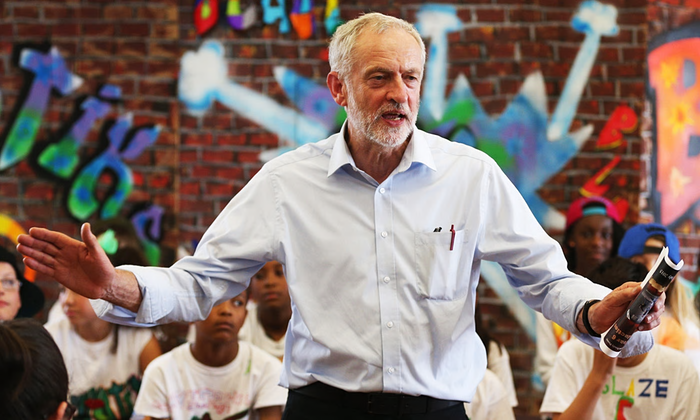
Tony Benn remarked that were two kinds of politicians signposts and weathervanes.
Signposts indicate the way ahead, resolute and unchanging in the face of criticism or challenge. Weathervanes spin on their axis, responding swiftly and unthinkingly to changes in the prevailing wind.
One is the politics of conviction – built on principle and a hard earned understanding of how things are for ordinary people and seeks to help. The other is the politics of opportunism that seeks only the easiest corridor to power for its own sake.
Unwittingly the Labour Party has given us the choice about which kind of politics we want – its clear from the overwhelming lead that Jeremy Corbyn has in the Labour leadership election that we want the politics of conviction and that few believe his rivals offer that.
Labour never intended to give us this choice. A last minute nominee, put forward because he was reluctantly willing to stand while others were not – Corbyn was only supposed to lend the election of another careerist right of centre politico some credibility – but boy has it backfired for Labour’s panicked leadership.
“There go my people, I must find out where they are going so I can lead them.”
that quote attributed to Alexandre Auguste Ledru-Rollin could easily be from any of Corbyn’s rivals, lost in focus groups and hollow PR media spin, they are three becalmed boats without any guiding stars of principle.
For Burnham, Cooper and Kendal the quote should read:
“There go the corporate media and the wealthy – I must find out where they are going so I can follow them”
Since Tony Blair arrived – Labour has not fought for a better society based on morals and principles – it has instead constantly repositioned itself around the prevailing winds, hoping that acquiescence to the status quo would win and retain power.
If Labour needed a signpost for how bankrupt this process is, they need only look at the oligarch owned media that they are so eager to please – the corporate press fights 24/7 to shape the political debate in a way that suits their agenda – they do this because they know that you have to fight for your principles and the sort of society you want.
Labour has become a party of opposition in name only. By becoming such an anaemic and supine political non-entity, democracy itself has been weakened to the point where most voters don’t even care anymore – but all that CAN change.
The scenes in meeting halls and on social media over the last few weeks have been extraordinary, the crowds and the support speak volumes – I haven’t seen such a buzz around British politics in my lifetime.
Two main reasons power this outpouring of excitement:
(1) In Jeremy Corbyn people recognise a politician of conviction who will actually fight on their behalf for things they want.
(2) People have a faint whiff of democracy again – and they like it.
The voter has been excluded from politics for decades, democracy reduced to a closed shop. The corporate media defines the boundaries of acceptable debate and two virtually identical groups of career politicians insist that their deathly neoliberal consensus represents the only ‘credible’ choices.
By giving Jeremy Corbyn a platform, Labour has pulled a brick from the wall that corporate power has built around Westminster and provided hope that we the ordinary voters might pull it down as surely as the Berlin Wall.
The reaction of the corporate media and their political apologists has been predictably hysterical – insisting that the wall must stand, that we have no choice, that we must return at once to the hopeless neoliberal political stagnation that serves only the wealthy few.
We must stand up to the barrage of propaganda and fear-mongering that has and will continue to be pumped out by vested interests in the media – for it is not our interests or those of society that they care about – but theirs.
But the cat is out of the bag – political change is this country need not always serve the wealthy – debate need not be a fait accompli, we can have a say and we can be heard.
As an oft maligned politician of principle once said:
“…if you ask me about those insoluble economic problems that may arise if the top is deprived of their initiative, I would answer ‘To hell with them.’ The top is greedy and mean and will always find a way to take care of themselves. They always do.”
Its time to reboot democracy in Britain.
Lets get Jeremy Corbyn elected whatever the usual suspects say…
…and then lets make sure we are never excluded from politics again – Corbyn can’t do it all for us.
So much rests on us re-engaging with the fight for a just and sustainable future.
See also: Sodium Haze on Facebook






It would be interesting if there could be any suggestions of how Labour grassroots supporters and members could organize to show opposition to the likes of Simon Danczuk who threaten to ride roughshod over democratic procedure.
http://www.independent.co.uk/news/uk/politics/well-try-to-oust-jeremy-corbyn-on-day-one-if-members-pick-him-says-labour-mp-simon-danczuk-10451581.html
I agree entirely – this made me very angry when I read it. He needs to find himself another career.
He’ll be up for reselection between now and 2020. Hopefully his local party members will take note of his contempt for the membership and for democracy.
I would hope for something a lot quicker than that.
We could flood the CLP’s and demand a vote on their de-selection if they didn’t shut up.
“The scenes in meeting halls and on social media over the last few weeks have been extraordinary, the crowds and the support speak volumes – I haven’t seen such a buzz around British politics in my lifetime.”
Were you around in 1983? I was, and bar the social media, it’s very much like things were then. Michael Foot was convinced he was going to win because of the number and passion of those who turned out to hear him speak.
Spoiler – he didn’t. He lost. Badly.
Energising the base is a very different thing to getting more people to vote for you in more constituencies across the country than anyone else. Still, best we get this tantrum out of the way now – maybe some of the new supporters will swing behind an actually electable candidate in May 2020, and get them to power in 2025.
But that’s a *long* way away.
I wasn’t around in 83 – but things are so different now – there is a widespread discontent with 30 years of neoliberalism that is there to be tapped. No-one else in the Labour Party has the wit to do that apart from JC. I have to say that while aligning the Labour Party to the agendas of the corporate media and the wealthy worked in 97 it was a one off sale of principles that has left Labour with little reason for existing aside from grabbing power for its own sake.
You think the Left is stronger now than it was in 83? And more people share our views?
Outside the echo chamber of social media, I think you’ll find you’re wrong. Look at the unions then and now, as one example. And when did this discontent with neoliberalism start, do you reckon? 87, 92, 97, 01, 05… 2010? When centrist/ rightist- or as you would say neoliberal – parties got elected? That doesn’t seem like a ‘one-off’ to me.
Nah. It’s the same people we always had talking to each other. But now you have twitter, so you think you’re a ‘movement’.
I don’t think the left is stronger – whatever that even means. I do think a great many people ache for a change from the closed shop of neoliberal politics – if all those people (like me) who defected to The Green Party or to UKIP, the SNP and other fringe parties had a Labour Party worth voting for then I see cause for optimism for a future Labour government. In a way I don’t give two hoots about Labour – if the only political reality for Britain is a continued drift towards a brutish right wing future policed by the corporate media then we are totally fucked. For now I choose to hope for a better outcome. That seemed to work well for the SNP.
You know why you had to go to a fringe party to get your views represented? Because they’re fringe views.
Pointless conversation. You guys are convinced of your own rectitude by listening to your own echoes. Go on, screw the party I’ve worked for for decades by choosing someone who will never win an election.
Don’t say you weren’t warned – see you back here in 2021.
You are arrogant, dismissive and frightened of change. You should work for The Guardian!
If you are responsible for building the Labour party into what it is today (and I doubt that very much, you write like a tory bigot) and you are happy with it then go join the Lib Dems or the Tories.. You belong there.
You seek to paint supporters of Corbyn as holding ‘fringe’ views – but many of the actual policies outlined by JC are supported not just amongst Labour supporters but have cross party support.
Only the propaganda of the corporate media places Corbyn on the hard left. JC is a natural moderate and a believer in social democratic values – get your head of the Murdoch press – you’ll feel much better.
Why 1983? Neoliberalism hadn’t been discredited yet unlike today – and that was a general not a leadership election.
The real parallel is 1975: a party loses 3 out of the last 4 elections during a period of stagnation in which the economic model of the previous 35 years is seen as discredited. A candidate emerges outside the prevailing centrist ideology of the party machine and is initially supported by 8% of the party.
She is only seen as someone that can liven up debate, nothing more, but introduces a new political platform after winning an election where 3 centre right candidates split the vote. Heavily criticised for her appearance, the party grandees expect her to only be in place for a few years until the party retreats back into its comfort zone as key centrist figures, Whitelaw, Powell, Prior and Hailsham write her off.
Sound familiar – it’s the reverse of what’s happening today and possibly the next great shift in the political paradigm as outlined by Gramsci and many others – unless the present system is ‘final’ and ‘fixed’ in which case Fukayama and Brzezinski are right for once?
The thing about Benn’s ‘weathercocks/signposts’ line is that it can be read another way. Certainly, it never led to much success for Benn himself, rightly or wrongly.
‘No compromise’ is not something that a lot of people find an endearing quality – it can come off as dogma. All of us make compromises in our lives, daily, and the world would be a meaner, less kind place if we didn’t. Similarly, all of our views have changed and developed over time, and I think a lot of people would view somebody who’s opinions have never changed as being dogmatic. If I were to be “unchanging in the face of criticism or challenge” I wouldn’t have a healthy relationship with my girlfriend, I wouldn’t have any friends, and I doubt I’d be able to keep a job very long. A lot of people don’t view compromise or moderation as bad, but they do view inflexibility and dogma that way. I’d imagine more voters feel that way than don’t.
As for the ‘mass movement’ – clearly, Jeremy Corbyn has energised a lot of people and that’s great, I hope a lot of them will stay on with the party whoever wins. But is it a mass, popular movement? I don’t know – and I think the point that the poster above raised about Michael Foot in 1983, where he ended up refusing to go back to party HQ to hear the ‘nay-sayers’ because he was getting such a good reception at events, is instructive. As was the 1992 election, where Kinnock got mobbed by adoring fans everywhere he went and promptly lost. If Jeremy Corbyn does win, then hopefully he will be able to carry that momentum over to a connection with a broader audience, but it’s far from certain he will. 600,000 people is a huge number of people for the ‘selectorate’ in a political party election, but in terms of the whole electorate it is a rounding error.